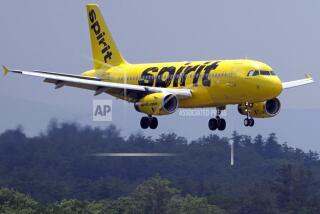Analysts See Airlines as Biggest Gainers : Travelers May Pay Price If People Express Fails
- Share via
NEW YORK — If People Express Airlines passes from the scene, it would generally be a positive development for the money-losing airline industry but a major loss for the consumer.
For struggling air carriers, it would mean that their major low-fare competitor was out of the way. But for the consuming public, it could mean an end to the low fares that have enabled many Americans to travel widely by air.
Those are the thoughts of most airline analysts in the wake of People Express Inc.’s surprise announcement Monday that it is looking into the possibility of selling all or part of the airline holding company. The firm owns People Express and Frontier airlines and two regional commuter lines--Britt Airways in the Midwest and Provincetown-Boston Airline on the East Coast.
“If People collapses or is sold,” said one observer who asked not to be quoted by name, “it is a real bad mark for the concept of deregulation. This is an airline that deregulation built. It gave meaning to the whole concept of deregulation.
Transformed Traveling Habits
“The biggest loser would be the traveling public. The majors (airlines with annual sales of more than $1 billion) would bring prices up.”
People Express is the most important of the dozens of airlines that were founded in the wake of federal deregulation of the airlines in 1978. The fledgling carriers transformed the traveling habits of the nation, their low-cost flights luring people away from cars, buses and trains--and from their living rooms.
But many of the upstarts have gone bankrupt, and none has had the impact or the success of People Express.
One reason for People’s survival so far has been its “no frills” policy. It charges extra if passengers want to check their luggage, and it charges extra for coffee, cocktails and meals.
Another is its low labor costs, which allowed it to keep operating costs below those of its competitors. At the end of last year, the airline’s operating cost per available seat mile (ASM) was still the lowest in the industry at 5.1 cents, compared to 7.6 cents for American Airlines and 8 cents for Delta Air Lines.
Fastest Growth in Airline History
People Express began in 1981 with 250 employees and three planes that flew only to Buffalo, N.Y., Columbus, Ohio, and Norfolk, Va., from the airline’s base in Newark, N.J. Now it provides service to 49 airports, including service to London, Brussels and Montreal, and it has a fleet of 79 planes, including seven 747 jumbo jets. Its growth has been the fastest in airline history.
But it has never been very successful financially.
‘It was a success story from the consumer’s point of view,” Louis Marckesano of the Philadelphia brokerage firm of Janney Montgomery Scott said Tuesday. “Maybe also from the point of view of size. They expanded their capacity and share of the market very quickly.
“But they had very few profitable quarters. They were buying market share with low prices but not accumulating much in the way of profits. They were supported with numerous stock and debt offerings.”
Until fairly recently, People Express had an insufficient number of telephone lines for reservations, and prospective passengers often got busy signals. The airline also is just now phasing in a seat assignment system. And it recently tried to rid itself of its reputation of catering only to college students and backpackers by instituting first-class service and a frequent flier plan in an effort to attract business travelers.
But its load factor--the percentage of seats filled--dropped to 53.6% in May from 66.9% in April. Just last week, trying to reduce the number of empty seats that it was carrying, People Express slashed its fares by an average of 30%.
Although most close observers of the industry believe that there will be major ticket price increases if People Express fails or is sold, not all agree.
Demise Not Imminent
“I don’t think that pricing will change for the better (from the airlines’ standpoint) if People dies,” said Mark E. Daugherty, an analyst with the brokerage house of Dean Witter Reynolds. “There are much bigger factors and influences on pricing than People Airlines--travel demand, capacity growth and the specific marketing and growth policies of 15 to 20 other airlines.”
Despite the financial problems that People Express has experienced almost from the day of its birth on April 30, 1981, most analysts do not think that its demise is imminent. Its immediate future depends in large part, they believe, on how much money the airline takes in this summer and whether or not the fare wars currently being waged abate somewhat.
“Yes, they are in . . . trouble,” said Scott J. Drysdale, an airline analyst with Birr, Wilson & Co. of Seattle. “But I don’t think we’ll see a total liquidation of this company.
“I think their cash-flow situation is hurting them severely, but let’s wait to see if there is a firming up of prices. Can they garner enough passengers in the summer to ease their financial situation? Unless they have a fairly nice cushion and some higher fares in the fall, they will be in serious trouble.”
People Express said Monday, when it disclosed that a sale was being considered, that it had “sufficient resources” to meet its current obligations and expected to have a positive cash flow for the rest of the summer.
With its acquisition of Denver-based Frontier Airlines last November, People Express became the nation’s fifth-largest airline in terms of numbers of passengers carried. However, that acquisition has added to its troubles because of a vicious fare war that Frontier has been forced to wage in the Denver market against Continental and United.
Rejoicing at Eastern
While People Express struggles to survive, few tears are being shed within the industry about its problems. In fact, there was “rejoicing” at an Eastern Airlines board of directors meeting Tuesday in New York, according to one director who did not want to be identified further.
“They are rejoicing,” he said, “because one more competitor may be gone, and that competitor has been leading the league in the reduction in fares.” He added that People Express’ announcement will probably result in its being shunned by both travel agents and passengers. “The announcement will further grease the slide of People,” he said.
A CHRONOLOGY OF THE AIRLINE
April 30, 1981: Begins airline service
with three Boeing 737s and flights from Newark, N.J., to Buffalo, N.Y., Columbus, Ohio, and Norfolk, Va.
May 26, 1983: Its only Boeing 747 touches down in London, opening a new chapter in no-frills airline history with $149 transatlantic flights from Newark.
Jan. 14, 1985: Signs a 25-year lease allowing it to take over one of Newark International Airport’s three major terminals.
Jan. 21, 1985: Announces fare increases averaging 10% because of general cost increases.
April 23, 1985: Introduces its first computerized reservation system, allowing customers to book flights by telephone without speaking to a sales representative. Now has a fleet of 68 aircraft, more than 4,000 employees and 394 daily flights to 32 destinations from its hub in Newark.
April 10, 1985: Announces its second fare increase in 2 1/2 months, saying it plans to raise rates by an average of 10%.
July 12, 1985: Announces its third fare increase of 1985.
Oct. 9, 1985: Gains a foothold in the West by acquiring Denver-based Frontier Airlines for about $300 million, outbidding Texas Air Corp. and a coalition of Frontier unions.
Dec. 3, 1985: During a pre-Christmas fare war, announces a monthlong, post-New Year’s fare schedule that cuts one-way rates to as low as $29 in the United States and to as low as $99 for transcontinental and transatlantic flights.
Dec. 27, 1985: Announces that it will buy Britt Airways, a Midwest regional carrier, for an undisclosed price.
April 28, 1986: Announces a frequent flier program.
May 1, 1986: Reports that it lost $58 million in the first quarter of 1986, attributing the loss in part to investment in new markets through new routes and acquisitions.
May 3, 1986: Receives approval from a federal bankruptcy judge in Tampa, Fla., to buy the failing Provincetown-Boston Airline for $30 million.
June 19, 1986: Announces unrestricted fare cuts averaging nearly 30% for most of its non-stop and connecting flights, citing lower fuel prices and its price-cutting strategy.
June 23, 1986: Announces that it is considering selling all or part of the company.
More to Read
Inside the business of entertainment
The Wide Shot brings you news, analysis and insights on everything from streaming wars to production — and what it all means for the future.
You may occasionally receive promotional content from the Los Angeles Times.










